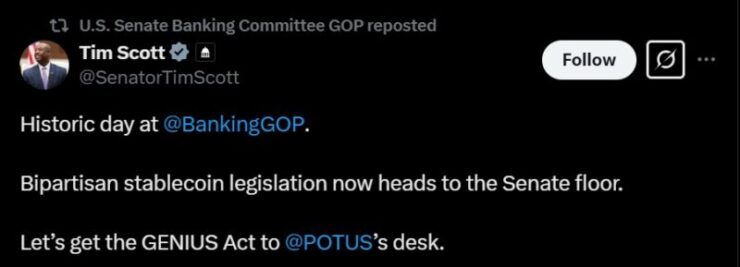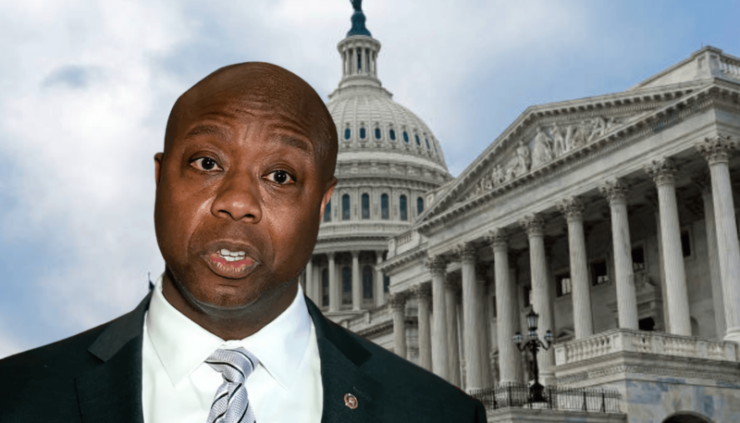The U.S. Senate Banking Committee has taken a significant step toward stablecoin regulation, voting 18-6 to advance the GENIUS Act (Guiding and Establishing National Innovation for US Stablecoins). Introduced by Senator Bill Hagerty (R-TN) in February, the bill seeks to establish a clear regulatory framework for stablecoin issuers, determining when they fall under state or federal oversight. The legislation has garnered bipartisan support, with Democratic Senators Angela Alsobrooks (MD) and Kirsten Gillibrand (NY) joining Republican lawmakers in backing the proposal.
The GENIUS Act aims to provide clarity for stablecoin issuers by introducing federal oversight while maintaining space for state-level regulatory frameworks. Senate Banking Committee Chair Tim Scott (R-SC) described the bill as a “bipartisan step forward” in ensuring that stablecoins remain a safe and reliable component of the financial system.

The House of Representatives is also working on its own version of stablecoin legislation, although the GENIUS Act is not a direct companion bill. Lawmakers say the efforts signal a growing willingness among Republicans to tackle key issues related to digital assets.
Opposition from Democrats and Big Tech Concerns
While some Democrats have supported the bill, Senator Elizabeth Warren (D-MA) has led opposition efforts, arguing that the legislation “fails to adequately protect consumers, competition, and national security”. A memo circulated by Warren’s office raised concerns that the bill would allow big tech firms to issue their own stablecoins, potentially undermining the U.S. dollar and creating digital financial empires controlled by private billionaires.
Warren specifically called out Elon Musk, warning that the billionaire’s increasing influence in financial technology could lead to the creation of a parallel economy dominated by corporate-controlled digital currencies. The issue recalls the failed Libra (later Diem) stablecoin project by Meta (formerly Facebook), which was abandoned after facing intense scrutiny from lawmakers and regulators.
During the committee hearing, Warren introduced several amendments to limit corporate involvement in stablecoin issuance, but they were ultimately rejected in a 13-11 vote.
Tensions Flare in the Senate Hearing
The markup hearing was marked by heated exchanges between lawmakers. Senator Catherine Cortez Masto (D-NV) expressed frustration over the lack of Republican participation during debates on key amendments, criticizing the process as unbalanced and lacking substantive debate.
Senator Warren went even further, calling the hearing a “show trial”, accusing Republicans of predetermining their votes without engaging in a meaningful policy discussion. Despite her opposition, she acknowledged that the bill had a strong foundation and indicated a willingness to continue refining the legislation.
Senator Hagerty defended the bill, insisting that it had gone through a “robust bipartisan process” and remained open for further improvements. He emphasized that while technical.
What Comes Next for Stablecoin Regulation?
The GENIUS Act now moves to the full Senate for further debate, with industry stakeholders closely watching how the legislation evolves in the coming weeks. The bill’s passage is seen as a crucial step toward a unified regulatory framework, addressing the legal uncertainties surrounding stablecoins that have persisted for years.
As the global regulatory landscape for stablecoins evolves, the U.S. risks falling behind major economies like the European Union and Japan, both of which have already implemented stablecoin-specific regulations. The Markets in Crypto-Assets (MiCA) framework in the EU is set to enforce strict compliance measures for stablecoin issuers by mid-2025, while Japan and Singapore have established clear licensing regimes for digital asset firms.
Quick Facts:
- The Senate Banking Committee voted 18-6 to advance the GENIUS Act, a bipartisan bill designed to regulate stablecoin issuers at the federal and state levels.
- The bill has received bipartisan support but faces opposition from Senator Elizabeth Warren, who raised concerns over big tech firms creating their own digital currencies.
- Stablecoins remain a key focus for the Trump administration’s pro-crypto stance, alongside broader efforts to investigate crypto debanking and repeal restrictive regulations.
- The bill’s passage comes as global regulatory bodies, including the EU and Japan, enforce stricter stablecoin oversight, making U.S. regulation increasingly urgent.





